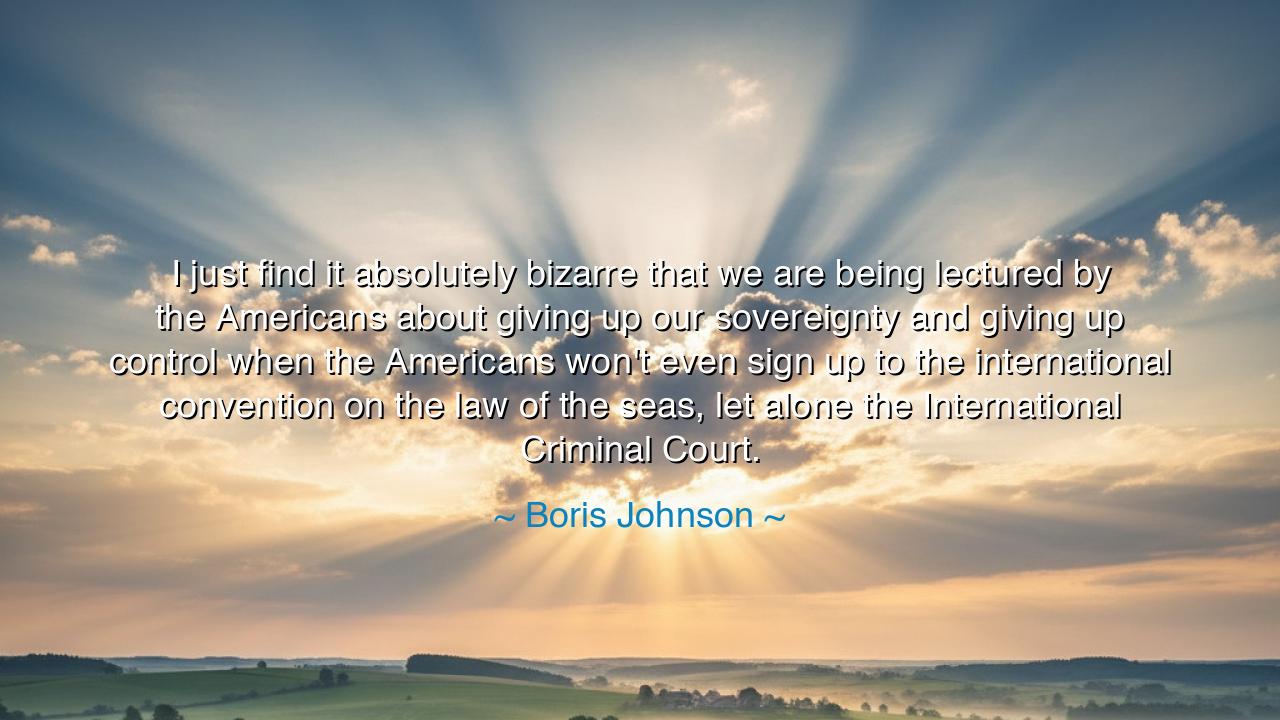
I just find it absolutely bizarre that we are being lectured by
I just find it absolutely bizarre that we are being lectured by the Americans about giving up our sovereignty and giving up control when the Americans won't even sign up to the international convention on the law of the seas, let alone the International Criminal Court.






In the sharp and defiant words of Boris Johnson, we hear the cry of a statesman wrestling with the eternal tension between sovereignty and power: “I just find it absolutely bizarre that we are being lectured by the Americans about giving up our sovereignty and giving up control when the Americans won’t even sign up to the international convention on the law of the seas, let alone the International Criminal Court.” These words, spoken in the spirit of indignation and irony, are not merely a political rebuke—they are an echo of a far older struggle, one that has defined nations and empires since the dawn of civilization: the struggle to balance freedom and influence, principle and hypocrisy, unity and independence.
Johnson’s remark was born in the crucible of Britain’s debates over its role in global governance—particularly in the years surrounding the Brexit movement, when questions of national control and international cooperation burned fiercely in the hearts of the people. His criticism aimed at the United States, a nation that often urges others to align with global frameworks, yet has itself refused to commit to certain international treaties—among them, the United Nations Convention on the Law of the Sea and the International Criminal Court (ICC). By highlighting this contradiction, Johnson sought to expose what he saw as moral inconsistency—that those who preach the virtues of global accountability often decline to be bound by it themselves. Thus, his words ring with both sarcasm and warning: no nation should be shamed for defending its sovereignty by those who guard their own so jealously.
The deeper meaning of this statement, however, stretches beyond the realm of politics. It is a reminder that true independence requires courage, and that sovereignty is not simply a word of pride, but a trust—a sacred responsibility to protect one’s own principles and self-determination. Every nation, like every individual, must decide how much authority it will yield to the collective, and how much it will keep in the sanctity of its own hands. To surrender control blindly is to risk one’s identity; to cling to it selfishly is to risk isolation. Between these two dangers lies the path of wisdom—the balance between cooperation and autonomy.
History offers us many mirrors of this eternal dilemma. In the age of Athens and Sparta, the Greeks struggled to unite under a common cause while preserving their city-states’ freedoms. Athens, proud of its democracy and intellect, often sought to lead; yet its power turned to dominance, and its alliances to empire. The Peloponnesian War followed, and with it, ruin. Their tragedy was the same that Johnson warns against: when the strong preach unity while serving their own dominion, the weaker must guard their independence, lest they lose not only freedom but dignity. For sovereignty, whether of a nation or a soul, is a fragile jewel—once surrendered, it is rarely regained.
Johnson’s words also reflect a broader philosophical truth about hypocrisy and self-rule. It is easy to advise others to yield control when one’s own power is secure. Yet the moral authority to lead comes only from example, not command. Nations, like men, earn respect through integrity, not by dictating virtue to others while exempting themselves from the same law. When Johnson calls it “bizarre” to be lectured by those who will not submit to the same standards, he is reminding the world that equality among nations means reciprocity of responsibility—that no voice, however powerful, should rise above the principles it demands from others.
Yet, let us not mistake Johnson’s statement for mere defiance. There is in his tone also a call to self-reliance—a spirit that urges nations to think for themselves, to discern truth amid pressure, and to act from conviction rather than fear. For the sovereignty of a nation, like the integrity of a person, is not preserved by shouting independence, but by living it—by crafting just laws, defending one’s people, and cooperating with others from strength, not submission. This is the same spirit that animated the leaders of old who refused to bend their nations to foreign crowns, and who understood that freedom without honor is hollow.
The lesson, then, is this: whether in the governance of nations or in the governance of the self, never yield your sovereignty lightly. Listen to counsel, but discern its motives. Work with others, but do not let cooperation become captivity. Hypocrisy will always wear the mask of wisdom; power will always disguise itself as virtue. Therefore, guard your principles as you would your homeland, and let your alliances be chosen not from fear, but from mutual respect. For the world will always contain both the strong who command and the wise who stand firm.
So, O listener, take heed from the spirit behind Boris Johnson’s words. Sovereignty—whether of state, of conscience, or of character—is not a wall but a flame. It must be protected, yet it must also shine. Beware of those who urge you to dim your own light while theirs burns unchecked. For in every age, the noblest strength is not in domination, but in the steadfast refusal to surrender the right to choose one’s own path.






AAdministratorAdministrator
Welcome, honored guests. Please leave a comment, we will respond soon